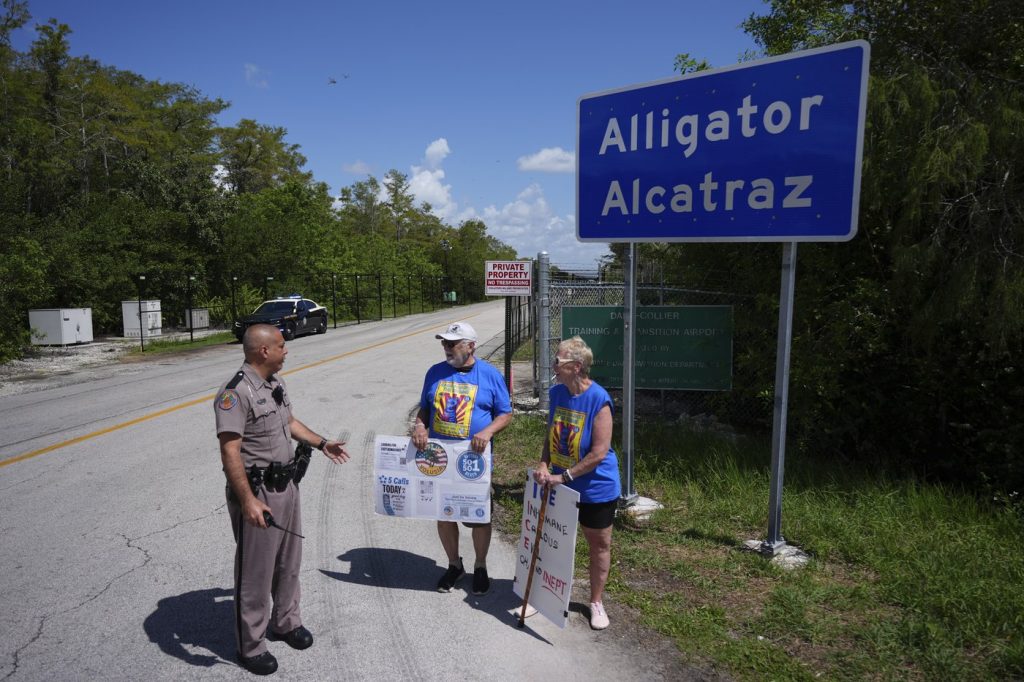ORLANDO, Fla. (AP) — Attorneys representing detainees at an immigration detention center in the Florida Everglades, colloquially known as "Alligator Alcatraz," prepared for their first court hearing on Thursday following a federal judge's order to wind down operations at the facility in a separate environmental case.
The central issue to be addressed in the federal court in Fort Myers, Florida, concerns how this ruling will affect the ongoing lawsuit alleging violations of the First Amendment. The lawsuit claims that detainees have been denied the right to meet privately with their attorneys, raising significant legal and ethical questions about the treatment of individuals within the facility.
In a noteworthy development, U.S. District Judge Kathleen Williams issued a preliminary injunction last month mandating the winding down of operations at the detention center by the end of October. This order requires the transfer of detainees to other facilities and the removal of equipment and fencing from the site. This injunction stems from environmental concerns raised by advocacy groups, including Friends of the Everglades and the Center for Biological Diversity, which argued that the facility was not in compliance with federal laws governing environmental impact assessments.
The facility was constructed in June by the administration of Republican Governor Ron DeSantis. It was positioned on an isolated airstrip to deter escape, reminiscent of a prison on an island off California, in support of former President Donald Trump’s efforts to deport undocumented individuals. The harsh location in the rugged Everglades was intended as a deterrent to potential escape attempts.
On Thursday, the hearing marked the first session since the legal rights case was transferred from Miami to Fort Myers, where U.S. District Judge Rodolfo Ruiz had previously dismissed one of the claims regarding detainee hearings in immigration court, declaring it moot. This occurred after the Trump administration designated the Krome North Processing Center near Miami as a site for hearing detainee cases.
In Miami, Judge Ruiz also approved the defendants' motion to change the venue for the remaining counts of the case. The current allegations focus on delays in scheduling meetings between detainees and attorneys, as well as the lack of private communication options via phone or videoconference at the detention facility, officially named the South Detention Facility.
Detainee attorneys argued that the preliminary injunction granted in the environmental case does not affect their case, as the detention center continues to operate and house detainees. Meanwhile, both state and federal governments have appealed Judge Williams' ruling, seeking to put her decision on hold. If their request for a stay is denied and the facility ceases operations, it could render the detainee rights lawsuit moot, as noted in court documents.
Should the stay be granted, however, state officials indicated plans to resume accepting detainees at the facility. They argued that the number of U.S. Immigration and Customs Enforcement (ICE) agents present at the center is minimal, with only four agents at any given time, and asserted that these agents do not control the site.
The pivotal question regarding control over the facility is a primary focus of the appeal filed by the state and federal governments against Judge Williams' ruling. The lawsuit that instigated this ruling by Judge Williams emphasized the failure of state and federal bodies to conduct the required environmental review for operating a detention center within the sensitive wetlands of the Everglades.
The federal government contends that it does not bear responsibility for the operational aspects of the detention center because it has not invested funds into its construction or maintenance, despite Florida seeking federal funding to support a portion of the project's expenses. Meanwhile, Florida officials maintain that the environmental impact statement requirements under federal law do not apply to state-operated facilities.











